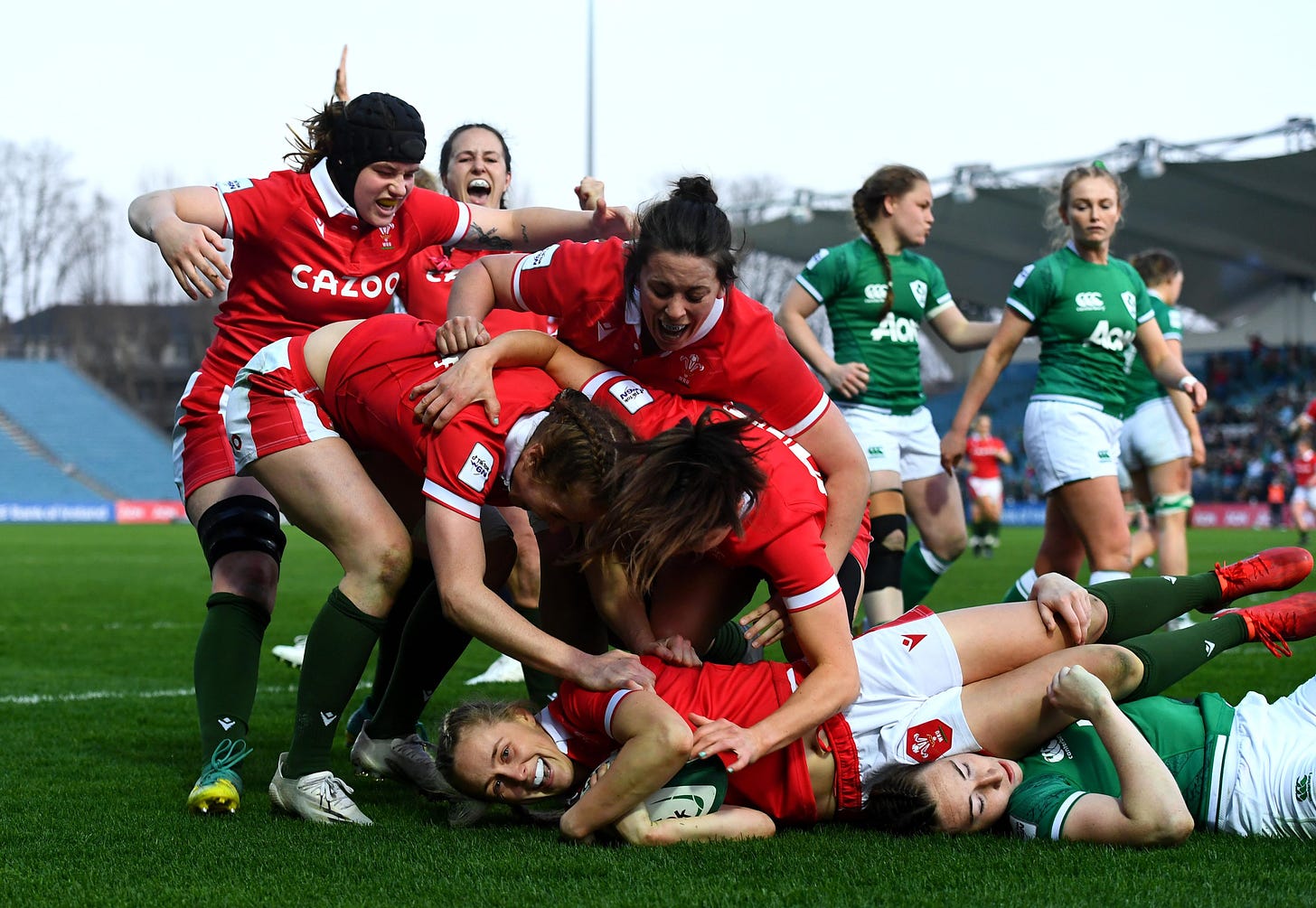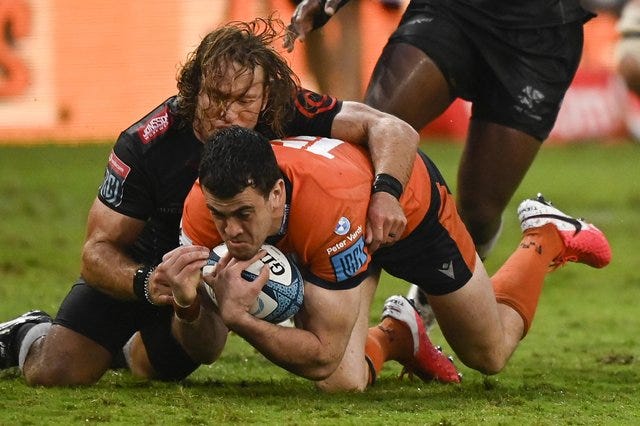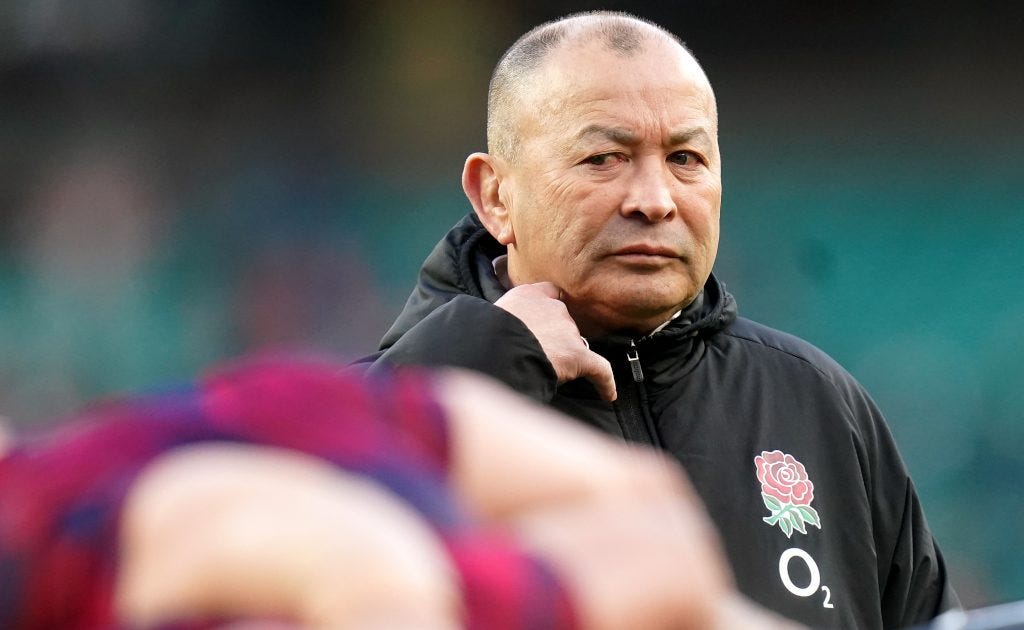#1 Wales' Women prove their worth. Plus more inside this week's newsletter.
Blair Kinghorn's fly-half stock rises as Curwin Bosch's falls. And what does a post-Eddie England look like?
Welcome to the first of my free weekly newsletters where each week I’ll be picking a few things from the rugby world, sharing my (hopefully) interesting opinions, thoughts, and musings. If you haven’t already, make sure you subscribe by popping in your email and hitting the nifty little button below. Enjoy!
See what happens with a bit of cash?
Wales start their TikTok Six Nations off with a bang, recording a historic win in Dublin.
Women’s rugby is growing rapidly, and at this stage of its development, the key is investment. Invest in the game, and it will deliver. Invest in female athletes, and they will deliver.
A year on from being hammered by Ireland at the Cardiff Arms Park by an abysmal 45 points, failing to score any of their own, Wales triumphed 27-19 in Dublin to open their Six Nations with a win, their first in the tournament since 2019. A fine performance from Elinor Snowsill, who pulled the strings for Wales as masterfully as she does for Bristol Bears on a weekly basis. Two tries from Donna Rose, who made an immediate impact off the bench. And lastly, the cherry on top of the cake that was Hannah Jones’ try in the closing moments, a spectacular 50m score to cap off a sensational day.
The result comes, incredibly, just two months after the decision was finally made to hand out professional contracts to 12 Welsh players, with more being put on part-time retainers. Investment justified. Its incredible how simple it is. Pay your players enough so they don’t have to balance rugby around full-time jobs such as teaching, carpentry, and even sheepdog training, and they will perform. The professional contracts alleviate so much pressure from female players, and allow them to fully focus all their energy on their rugby.
Professionalism is about more than just being paid. It extends to having access to high-quality environments to train and hone your talent, top-level coaching and backroom staff. It is about small things like being provided with food in camp - one less thing for them to worry about.
"A really small thing, but it makes a huge difference. Straight away, it takes even more pressure off having to meal prep and make sure you’re eating properly. Being given supplements, protein and stuff, all these things that you think are such small things but when you’re an amateur player, is another expense and another thing you have to do yourself. They’re doing everything they can to make it as easy as possible for us." - Wales fly-half Elinor Snowsill. (WalesOnline)
The result comes at a pivotal time for the Wales Rugby Union (WRU), who are in turmoil over allegations of sexism and misogyny within the organisation. Investment in women’s rugby is not just about pumping money in. There needs to be a cultural shift in the entire organisation, double for the WRU, clearly.
The goal should not just be parity with the men, it shouldn’t just be looked at as another stream of revenue. The WRU cannot invest once, rest on their laurels, and expect to be off the hook, it requires consistency. There is still plenty to improve. The implementation of player pathways, the establishment of U20 and U18 sides, and plenty more.
WRU-condemnation aside, Saturday was a beautiful start to the professional era for Wales’ Women.
One 10 on the up, another on the down.
Edinburgh down the Sharks in Durban, becoming the first NH team to win in South Africa.
Plenty of match reports following this game mentioned that the conditions in Durban gave the visiting team an edge over the Sharks, due to Edinburgh being, well, from Scotland. Given the way Edinburgh have played this season - the scintillating offense instilled by Mike Blair, where players are encouraged to make decisions rather than being tied to a set system - the last thing that Edinburgh would want is a sedated slog of ‘up the jumper’ rugby.
Much of the blame for the Sharks’ loss will no doubt fall on the shoulders of their fly-half, Curwin Bosch, who had a miserable outing. Bosch was once viewed by many in South Africa as a man destined for the Springboks 10 jersey, yet, he has slipped further and further away from that goal in the past year. His ability to command a game in open play and put others into space is not up to scratch for a fly-half.
There is no question that Bosch is talented. What the 24-year-old is supremely good at is his kicking ability. From the tee, he has accuracy and range in abundance. And he has the ability to orchestrate an on-point kicking game and bombard the opposition from the pocket. For Bosch, it seems his usually stellar kicking ability tends to hide his inconsistency and defensive frailties. But when his kicking game is off, such as missing a number of penalties and some poor out-of-hand kicking against Edinburgh, there seems to be little else that the fly-half currently offers to the Sharks. Bosch has become a much maligned member of a squad studded with stars, but, head coach Sean Everitt has faith in him, even if the fans do not.
Being a professional athlete, especially one such as Bosch whose destiny was predetermined to aligned with many an international appearance, can bring an immense amount of mental strain. Of course, it is perhaps presumptuous to assume that Bosch has struggled with the expectations placed on him, but he would not be the first, nor the last rugby player to fall short of his potential because of this. Some players choose to stand push through the wall that stands before them. Others recognise the situation they find themselves in and realise that a fresh start somewhere else is much needed.
Opposite Bosch, Edinburgh’s Blair Kinghorn had an excellent display. Made even better by the monsoon conditions in which played. The attacking style of rugby Edinburgh have espoused this season fits Kinghorn superbly, seeing him turn from a dependable utility back, into a confident fly-half his side can rely on. Against the Sharks he scored twice, including one in which he showed off his impressive footballing skills on the waterlogged pitch to dribble the ball into the in-goal area and score. It was a performance which proved that the Kinghorn at 10 experiment is one worth investing in.
Kinghorn is unfortunate, in a way, to be in the same generation of Scottish talent as Finn Russell and Stuart Hogg. Hogg is of course one of the best fullbacks in the world, and certainly one of Scotland’s greatest talents, and Russell holds the key to a Scottish attack that has been designed with his playmaking fluidity in mind.
What goes in Kinghorn’s favour, however, is that often even Russell cannot pull off the attacks he designs. When his subtle no-look pops go to hand or his crafty cross-field kicks land perfectly, Russell is unplayable. When he is on, Scotland are on. So naturally, when he is off, so are Scotland, as evidenced by Russell’s lacklustre performances in the latter stages of the Six Nations this year. Kinghorn has a long journey of improvement ahead of him if he is to catch, and eventually eclipse Russell at 10, but his performance against the Sharks is one crucial step on that journey.
Post-Eddie England?
The chiefs at the Rugby Football Union (RFU) stated their desire for Eddie Jones’ successor to be English, the ideal plan being that they’re embedded within the programme prior to Jones’ departure, emulating how Fabien Galthie worked alongside Jacques Brunel during the 2019 World Cup. So, who could be on the shortlist?
Candidate number one currently is surely Steve Borthwick, who has reshaped a poor Leicester Tigers team into champions-elect. Indeed, Borthwick has spent time in the England setup before, being forwards coach between 2015-2020, as well as being Jones’ assistant in Japan prior. He certainly has the required international experience that Conor O’Shea called a ‘prerequisite’ for the role. But, his experience as a head coach is confined to just one and a half seasons at Welford Road, albeit a period of remarkable transformation. Could that matter? It might. It might not. Regardless, he’s shown that, in a short amount of time, he can produce a side that plays attractive winning rugby. Blending a dominant forward pack with a energetic attacking output.
There are others, Rob Baxter’s name will likely be in the mix, although he seems to prefer the steady, long-term club environment he has at Exeter. The RFU could attempt to lure Andy Farrell from Ireland’s clutches, but that doesn’t seem likely. It is definitely too early for Alex Sanderson.
I think having an impetus on building homegrown coaching talents is important, but frankly, I’m not sure how wise it is to then limit the most important job in English rugby, to a handful of candidates.
There is a wealth of non-English coaching talent who are more than qualified for the role. Hiring a non-English coach doesn’t mean compromising your style, and it certainly doesn’t mean hiring someone who has no connection to the English game. Mark McCall, for instance, has enjoyed a decade of unparalleled success at Saracens. Under him, the club have won the Premiership five times and the European Cup three times, resulting in one heck of a CV. International rugby might be a different beast to club rugby, and the job of peaking once every four years with limited time together is vastly different to setting out to win on a weekly basis. But a resume such as McCall’s demands a look-in. Particularly as he has plenty of experience dealing with a number of big name players that make up the England squad.
Anyway, are you telling me the RFU really wouldn’t take Scott Robertson if the Kiwi fancied a crack at Twickenham?
Hope you enjoyed this week’s newsletter. Don’t forget to subscribe, share, or leave a comment if you fancy. See you next week.






